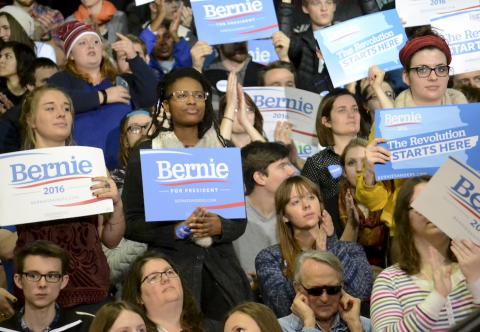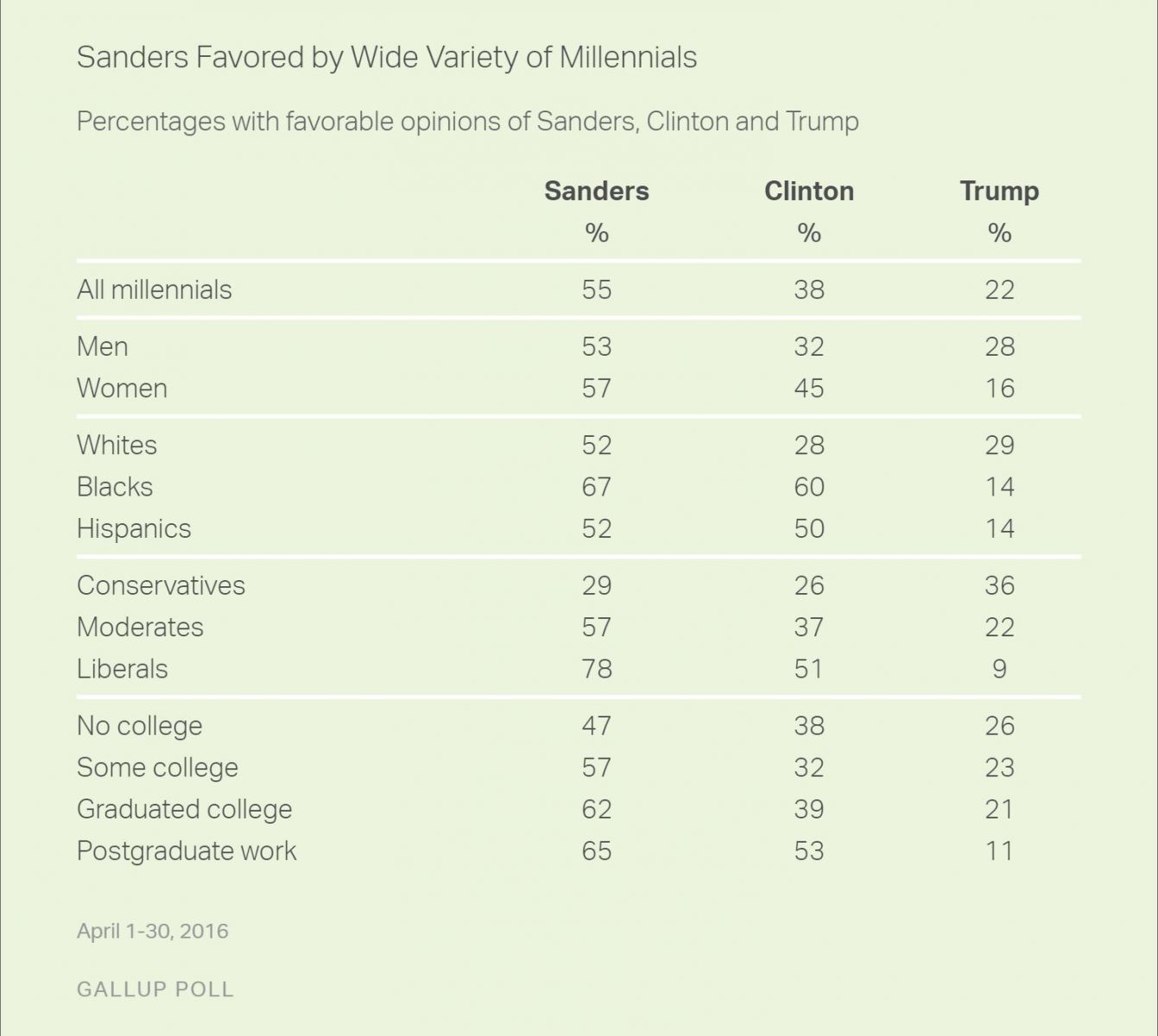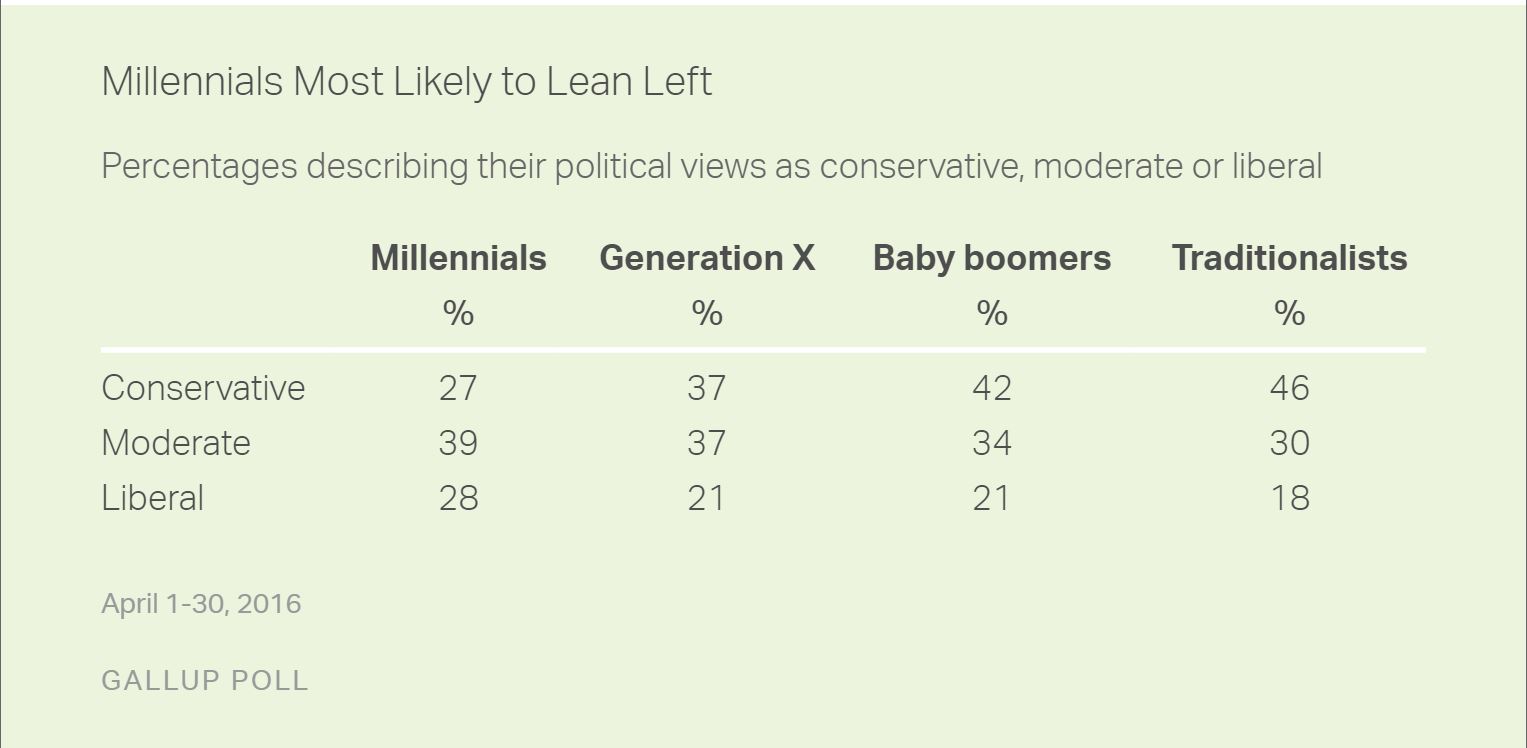WASHINGTON, D.C. -- Bernie Sanders is now considered a long shot for the Democratic presidential nomination, but his quest has accomplished one of his main goals -- scoring major points in the contest for the hearts and minds of America's youngest voters. Millennials, the generation of Americans aged 20 to 36, are far more likely to have a favorable opinion of Sanders (55%) than presumptive Democratic nominee Hillary Clinton (38%) or her Republican counterpart, Donald Trump (22%).
Gallup Daily tracking polls conducted in April show Sanders bests Trump and Clinton among most millennial subgroups -- specifically, with both men and women, with whites and blacks, with all education and most income levels, with moderates and liberals, and with Democrats and independents. Trump does better than Sanders or Clinton among Republicans and conservatives.
Millennials are significantly more likely than older Americans to view Sanders favorably, and are significantly less likely to have a favorable opinion of Trump. There is little difference between the two age groups concerning favorable views of Clinton. Millennials differ greatly from older Americans among several subgroups:
- Eighty-two percent of millennial Democrats view Sanders favorably, compared with 64% of older Democrats. Those figures are almost exactly reversed for Clinton: 64% of millennial Democrats view her favorably, compared with 81% of older Democrats.
- About half (51%) of conservatives aged 37 and older view Trump favorably, while 36% of millennial conservatives do.
- Eighty-two percent of blacks older than 36 view Clinton favorably. That figure drops to 60% among black millennials.
Sanders' popularity among younger Americans is not surprising. As the most liberal of the three candidates, he benefits from the fact that millennials have consistently been the most liberal of the generations that currently make up the U.S. electorate. Twenty-eight percent of millennials describe themselves as liberal, compared with 21% in Generation X (aged 37 to 51), 21% of baby boomers (aged 52 to 70) and 18% of traditionalists (aged 71 and older).
Millennials: Good Candidates, but Bad Process
In Gallup polls conducted each month in 2016, majorities of millennials have consistently reacted positively to certain aspects of this year's presidential election, but have expressed dissatisfaction with the overall campaign process.
Combined results from Gallup's January-April polls show 60% of millennials say the presidential candidates are talking about issues they really care about. And when asked whether there is "any candidate running who you think would make a good president," a majority say that there is. But fewer millennials have much confidence in the campaign process so far: Just 32% say the way the presidential campaigns are being conducted makes them feel the election process is working.
Older Americans are more likely than millennials (70% vs. 59%, respectively) to think there is a good candidate running this year. On the other two questions, millennials' views align closely with those of older Americans.
Gallup also tracks how closely Americans follow election news. Millennials (21%) are less likely than the other three major generational voting groups to say they follow the news "very closely." Thirty-five percent of those in Generation X, 48% of baby boomers and 48% of traditionalists say they closely follow election news. This follows the pattern seen in previous elections in which younger adults were less likely to be deeply immersed in election news.
Bottom Line
The leading edge of the millennial generation had just turned 21 when terrorists attacked the U.S. on Sept. 11, 2001. Since then, millennials have also contended with wars in Iraq and Afghanistan, the collapse of the housing bubble, the Great Recession, and the nation's subsequent struggle to regain lost economic ground.
Faced with these challenges, millennials have responded positively to Sanders, whose platform calls for the most liberal and some of the most drastic changes to the U.S. economic and political landscape. Not only do millennials have favorable views of him personally, but there are also indications they are more likely than older generations to back his policies. Sanders is expected to lose his fight for the Democratic nomination, but he seems to be succeeding at building a foundation for his progressive movement among the voters who will have the greatest say about the nation's direction in the long run.
Download How Millennials Want to Work and Live for an in-depth look at how the millennial generation is reshaping politics, the economy, the workplace and the marketplace.
Survey Methods
Results for favorable attitudes toward the candidates are based on telephone interviews with 1,754 millennials and 7,101 adults aged 37 and older, conducted April 1-30, 2016. Results for views on how campaigns are being conducted are based on nightly polls conducted April 15-17 that included a random sample of 866 millennials and 3,606 older Americans. All respondents were aged 18 and older, living in all 50 U.S. states and the District of Columbia. For results based on the sample of 1,754 millennials, the margin of sampling error is ±3 percentage points at the 95% confidence level. For results based on the sample of 866 millennials, the margin of sampling error is ±4 percentage points at the 95% confidence level.
Each sample of national adults includes a minimum quota of 60% cellphone respondents and 40% landline respondents, with additional minimum quotas by time zone within region. Landline and cellular telephone numbers are selected using random-digit-dial methods.
Learn more about how the Gallup Poll Social Series works.




Spread the word